In what form is MEZYM available?
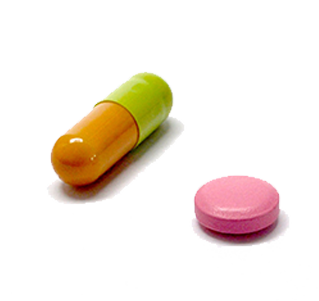
Mezym is available in three galenic forms –film-coated tablets, enteric-coated tablets and gelatin capsules containing enteric-coated minitablets for even better efficacy.
Thanks to its small size and smooth surface both the enteric-coated and film coated tablets are very easy to swallow. Never chew or bite the pancreatin tablets.
The “enteric coating” term means that the tablets are covered by acid-resistant film which does not dissolve in the stomach. Thanks to this special coating the pancreatic enzymes can safely travel from the stomach to the small intestine where they are released and become active.
The capsules contain tiny enteric-coated tablets, that can mix with the food evenly. The efficacy of digestive enzymes in this form is improved. That is why the minitablets are generally preferred.
For better intake, the hard capsules can also be opened and only the capsule contents swallowed whole with a glass of liquid.
Before using Mezym always read the patient information leaflet carefully.
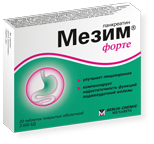
Mezym 3500
film-coated tablets
Active ingredients:
Lipase* 3 500
Amylase** 4 200
Protease** 250
Packaging:
20, 80 tablets

Mezym 10 000
enteric-coated tablets
Active ingredients:
Lipase* 10 000
Amylase* 7 500
Protease* 375
Packaging:
10, 20, 50 tablets

Mezym 20 000
enteric-coated tablets
Active ingredients:
Lipase* 20 000
Amylase** 12 000
Protease** 900
Packaging:
20, 50, 100 tablets
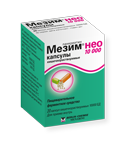
Mezym 10 000 V
gelatin capsules
Active ingredients:
Lipase* 10 000
Amylase** 9 000
Protease*** 500
Packaging:
20, 50 capsules
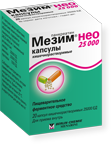
Mezym 25 000
gelatin capsules
Active ingredients:
Lipase* 25 000
Amylase** 22 500
Protease** 1 250
Packaging:
20, 50, 100 capsules
*digestive enzyme that breaks down fats
**digestive enzyme that breaks down saccharides
***digestive enzyme that breaks down proteins
How does MEZYM work?
Pancreatin, the active substance of Mezym, is a combination of digestive enzymes that helps break down proteins, fats and carbohydrates into smaller particles so that the body can get all the necessary nutrients it needs.
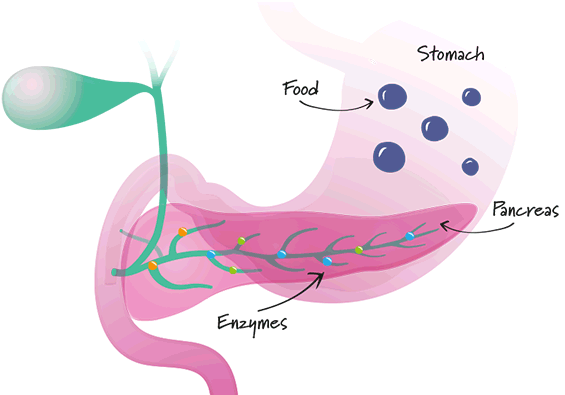
- Healthy pancreas
Digestive enzymes made in the pancreas break down proteins, fats and carbs into smaller particles. - Patient with digestive problems
If there is any disturbance in the pancreas, there is a lack of digestive enzymes and the fats, proteins and carbs are not broken down properly. - Patient taking Mezym
Mezym replaces the lacking enzymes and helps to digest food.
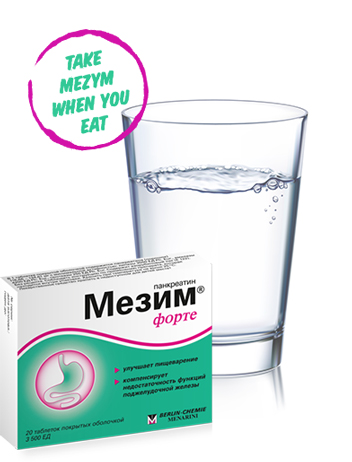
How to use MEZYM?
The dosage should reflect the severity of the pancreatic insufficiency. Please consult your doctor regarding the dosage. A lipase rate (amount of the digestive enzyme responsible for breaking down fats) per meal of 20,000 – 40,000 units is recommended as a general guide dose but it may reach above the stated range.
An increase in the dose should take place only under medical supervision and be aimed at improving the symptoms (e.g. steatorrhea, stomachache).
The daily enzyme dose of 15,000 – 20,000 units of lipase per kg of body weight should not be exceeded.
Particularly in patients with cystic fibrosis, the dose should not exceed the enzyme dose necessary for adequate fat absorption, accounting for the quantity and composition of meals.
In children Mezym should be used only under medical supervision.
Read the patient information leaflet carefully.
Digestive enzymes are substances that break down food into smaller particles and thus enable the body to get all the necessary nutrients.
Pancreatin is a combination of digestive enzymes produced by pancreas.
Lipase is a digestive enzyme that breaks down fats.
Cystic fibrosis (CF) is a genetic disorder that affects mostly the lungs, but also the pancreas, liver, kidneys and intestine.
PERT is a type of medication that is used to replace pancreatic digestive enzymes in case of exocrine pancreatic insufficiency.
Galenic forms are forms in which the drug can be administered (tablets, capsules, suspension etc).
Most of the nutrients in food fall into three major groups: proteins, fats, and carbohydrates.
Steatorrhea – oily stools due to the reduced absorption of fat by the intestine.
